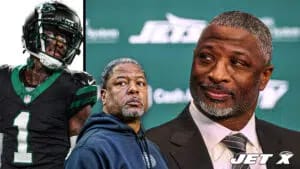Don’t be surprised if the New York Jets’ defense isn’t quite the same in 2023
The New York Jets’ defense was an indisputable top-five unit in 2022. Here are some of the Jets’ key defensive ranks from last year:
- Points per game: 18.6 (4th)
- Points per drive: 1.57 (2nd)
- Yards per game: 311.1 (4th)
- Yards per drive: 27.3 (2nd)
- Defensive DVOA: -10.1% (5th)
Will the Jets be able to replicate this outstanding production in 2023?
It’s certainly possible, but it should not be considered a sure thing. There are some red flags that suggest the Jets’ defense is due for regression. That’s not to say the unit will be bad, or even average – it’s too talented to stoop that low (barring catastrophe). It just might not be quite as dominant as it was in 2022.
Here are two reasons New York’s defense might take a step back in 2023 due to factors that are beyond anyone’s control.
1. The Jets benefited from an easy slate of opposing quarterbacks
Due to various injuries, the Jets lucked into a soft schedule of opposing quarterbacks in 2022. They played five games against a team that did not have its usual starting quarterback, and in another game against the Pittsburgh Steelers, the starting quarterback was benched at halftime for a rookie making his NFL debut.
I wanted to deduce the average talent level of the quarterbacks to face the Jets in 2022. To do this, I compiled the season-long 2022 passer ratings of every quarterback to face the Jets and weighed them based on how many pass attempts they threw against the Jets. This way, the quarterbacks who threw the most passes against the Jets had the most weight in the overall average.
The Jets faced 20 quarterbacks last season. Combined, their average passer rating in 2022 was 86.2 after weighing each player based on how many pass attempts they threw against the Jets.
Here are the quarterbacks the Jets faced in 2022. It’s not exactly a murderer’s row.
I conducted the same exercise for every team in the NFL. As it turns out, the Jets faced the second-easiest slate of opposing quarterbacks based on 2022 passer ratings. Only the Cincinnati Bengals faced an easier batch of quarterbacks.
To the Jets’ credit, they usually exceeded expectations even when they did face a good starting quarterback. They held Josh Allen’s Bills offense to its two lowest yardage outputs of the season (317 in Week 9 and 232 in Week 14), they shut down Aaron Rodgers at Lambeau Field (Green Bay’s 10 points in that game was the second-fewest ever scored by a Rodgers-led team at Lambeau), and they held Jared Goff’s red-hot Lions offense to its lowest scoring output over Detroit’s 8-2 finish to the season (13 points on offense).
Still, there is no doubt that the Jets’ defensive stats were aided by playing so many games against backup quarterbacks. New York racked up big numbers against those guys. Thompson, Rypien, Siemian, Brissett, and Pickett combined for two touchdowns and seven interceptions against the Jets. All other quarterbacks combined for 13 touchdowns and five interceptions.
Most likely, the Jets will face a harder schedule of opposing quarterbacks in 2023, so even if they perform equally well, their numbers against the pass will naturally decline at least a little bit simply because of the increase in the quality of competition.
And with quarterbacks like Patrick Mahomes, Jalen Hurts, Justin Herbert, Dak Prescott, and Deshaun Watson looming on the schedule – as well as two potential games against Tua Tagovailoa that they managed to avoid in 2022 – there is a chance the Jets could end up facing one of the league’s toughest schedules of opposing quarterbacks. It would be a complete reversal from 2022.
2. The Jets enjoyed incredible injury luck in 2022
In 2022, the Jets’ injury luck was a tale of two units. On offense, the Jets could not catch a break. But on defense, the Jets were unbreakable.
Football Outsiders tracks a metric called “adjusted games lost” (AGL) that aims to quantify how much value a team lost due to injuries. It weighs the value of an injured player based on whether the player is a starter or reserve, and it also accounts for players who play through injuries.
The 2022 Jets offense had the fourth-most AGL of any offense in the league, with a whopping 77.5. However, the Jets’ defense suffered from only 8.6 AGL, which was the fewest of any defense in the NFL. That’s nearly 30 fewer AGL than the average defense (38.5) and less than half of the second-ranked Jaguars (19.9).
New York managed to push through the entire season without any significant long-term injuries on defense. Vinny Curry led the unit with six missed games due to injury while Jermaine Johnson and Lamarcus Joyner followed Curry with three apiece – and those three guys didn’t have major roles in the Jets’ success, anyway. Outside of Curry, Johnson, and Joyner, none of the Jets’ main defensive players missed more than two games due to injury.
The health in the secondary was particularly miraculous. The Jets’ cornerback trio of Sauce Gardner, D.J. Reed, and Michael Carter II recorded perfect attendance, playing 17 games apiece. Safety Jordan Whitehead also played in all 17 games.
In the front seven, four of the Jets’ best starters played in all 17 games: John Franklin-Myers, Carl Lawson, C.J. Mosley, and Kwon Alexander. Quinnen Williams only missed one game, as did Micheal Clemons. Sheldon Rankins and Quincy Williams missed two each.
The Jets’ defensive health certainly played a massive role in their success. Backups rarely had to be thrust into featured roles for extended periods of time. In most games, the Jets were missing no more than one or two starters, and in many games, the entire starting lineup was on the field.
It is difficult to envision the Jets replicating this feat in 2023.
New York’s likely regression in the injury department is particularly troublesome because of how the Jets’ defensive depth chart is structured. The top of the depth chart is fantastic – the 2022 season proved it, showing how elite the unit can be when all of the starters are healthy. But it’s a top-heavy depth chart. The bottom end of the Jets’ depth chart looks weak at many positions.
Yes, every defense in the NFL will experience a drop-off from starters to backups. However, I would wager the Jets’ drop-off would be larger than most teams.
Think about the cornerback and defensive tackle spots, specifically. At cornerback, the drop-off from Sauce Gardner or D.J. Reed to Brandin Echols would completely alter how teams attack the Jets. At defensive tackle, the Jets are one Quinnen Williams injury away from having what would probably be one of the worst interior defensive lines in the NFL (especially against the run – maybe moving Franklin-Myers inside could save the pass rush, but the interior run defense would be a mess without Williams).
Then, think about safety and linebacker. Both positions are backed up by a plethora of unproven youngsters who are mostly Day 3 draft picks or undrafted free agents. The Jets do have plenty of depth on the edge, but that is the only defensive unit that seems equipped to survive injuries at an adequate level.
In addition to the roster structure, the Jets’ defensive scheme is potentially problematic for handling injuries. The scheme is very talent-reliant. Robert Saleh and Jeff Ulbrich do not get overly creative to try and generate schemed-up pressure or fool quarterbacks with complex looks in coverage. Their scheme is predicated upon simplicity. It is designed to minimize how much thinking the players have to do, allowing them to play fast and free.
What this philosophy does is magnify the talent level of the players. It makes elite talent look even better – see the 2022 Jets and the peak 49ers and Seahawks teams that Saleh was a part of. But it makes poor talent look even worse – see the 2021 Jets and Saleh’s first two years in San Francisco.
The bottom line is that the Jets’ scheme mostly ignores complex mind games in favor of letting the players dictate the results. The coaches don’t do much scheming to work around the players, which can lead to awesome results when the players are good, but when they are not, it gets you into trouble.
I am skeptical of whether the Jets are built to handle injuries on defense. Luckily, that theory did not have to be tested in 2022. It will be in 2023.
The durability of New York’s defense in 2022 was a football miracle. Most likely, the Jets will be forced to deal with significantly more defensive injuries than they did last year. Heck, the football gods have already gotten to work on balancing the scales, as projected starting safety Chuck Clark is out for the season with an ACL tear.
Bottom line
Ultimately, the fact of the matter is that New York’s defense benefited from unbelievable luck in 2022. They were remarkably healthy and got to face an easy schedule of quarterbacks. These two factors play an instrumental role in determining a team’s defensive success, and both are out of anyone’s control. They are completely random.
Since both factors are randomly determined, it means the Jets could land anywhere from 1 to 32 in each category during the upcoming season. In all likelihood, they will not have a second consecutive season of being the luckiest team across these two categories. There are 31 opportunities to regress and just one opportunity to stay the same.
This is not to say that the Jets’ 2022 defensive success was entirely dependent on their luck with injuries and opponent quality. Of course not. It was a great unit, without question. Barring catastrophic injuries to the wrong players, this unit’s floor is high thanks to its overall talent.
And the ceiling is tantalizing, too. There are legitimate reasons to believe it could play even better than it was last year (hello, fumble recovery luck), which could counteract the regressions in injuries and competition to help the unit either maintain its top-five ranking or perhaps climb higher.
But if you adjusted both of these luck-based factors to league-average in 2022, the Jets probably would have had somewhere around the 10th to 12th-best defense rather than fourth or fifth-best defense. This type of drop feels like a fair expectation for the 2023 season. It seems overly pessimistic to say the Jets defense will assuredly regress from elite to average or below-average solely based on its schedule and injuries, but dropping from top-five to top-12 feels realistic.










